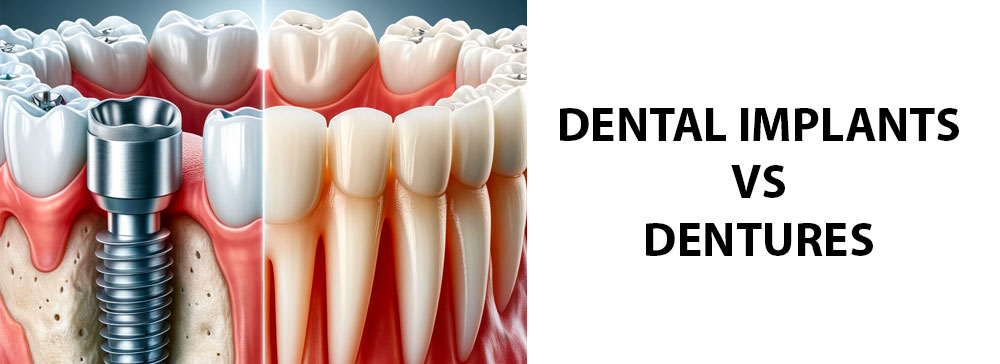Missing teeth can be more than just a gap in your smile; they can also lead to a host of oral health issues and can negatively affect your self-esteem. In this article, we’ll explore two popular alternatives: dental implants and dentures. We’ll learn about the pros and cons of each option and discuss the costs involved, helping you make an informed decision about which solution best fits your needs and budget.
If you need dental implants in the Salt Lake area, we can help you! We have offices in Salt Lake City and South Jordan full of experienced staff. Click the button below to request an appointment or give us a call!
Dental Implants
Pros:
- Durability: Dental implants are designed to last a lifetime with proper care, making them a long-term solution.
- Natural Appearance: They closely resemble natural teeth in both look and feel, providing a more aesthetically pleasing result.
- Bone Health: Implants stimulate the jawbone, preventing bone loss that often occurs with missing teeth.
- Functionality: They restore nearly full chewing ability, allowing you to eat a wider variety of foods.
Cons:
- Cost: Dental implants are typically more expensive than dentures, with costs ranging from $3,000 to $4,500 per implant.
- Surgical Procedure: The process involves surgery, which comes with associated risks and a longer recovery time.
- Time-Consuming: The entire process, from implant placement to final restoration, can take several months.
Dentures
Pros:
- Cost-Effective: Dentures are generally more affordable than dental implants, with prices ranging from $600 to $2,500 for a complete set.
- Non-Invasive: No surgery is required, making them a good option for those who cannot undergo surgical procedures.
- Quick Solution: They can be fabricated and fitted relatively quickly, providing a faster solution for missing teeth.
Cons:
- Less Stable: Dentures may slip or move, causing discomfort and making it difficult to eat certain foods.
- Bone Loss: Unlike implants, dentures do not stimulate the jawbone, which can lead to bone loss over time.
- Maintenance: They require daily removal and cleaning, and they may need to be replaced every 5 to 8 years.
Dental implants offer a more permanent and natural solution but come with a higher cost and a longer treatment process. Dentures, on the other hand, are more affordable and quicker to obtain but may not provide the same level of comfort and functionality. The choice between the two will depend on your individual needs, budget, and overall oral health.
Dental Implants vs Partial Dentures
Partial dentures are a removable dental appliance designed to replace one or more missing teeth in either the upper or lower jaw. They consist of artificial teeth attached to a gum-colored plastic base, which is connected by metal framework that holds the denture in place. Partial dentures are used when there are still some natural teeth remaining in the mouth, as they help to fill in the gaps and prevent the remaining teeth from shifting out of position.
Partial dentures not only improve the appearance of your smile but also restore functionality, making it easier to eat and speak. They are a more affordable alternative to dental implants or bridges and can be easily removed for cleaning and maintenance. It’s important to note that partial dentures may require some time to get used to, and regular dental check-ups are essential to ensure a proper fit and the overall health of your mouth.
Does Insurance Cover Dental Implants?
Whether dental insurance covers dental implants can vary depending on your specific insurance plan and provider. In Utah, dental insurance has traditionally not covered dental implants because they are often considered a cosmetic procedure. However, this is changing as the benefits of implants for overall oral health and functionality become more widely recognized. Some insurance plans now offer partial coverage for dental implants, typically covering a portion of the cost of the implant, the abutment, and the crown.
Coverage can range from 50% to 80% of the total cost, depending on the plan. It’s important for Utah residents to check with their insurance provider to understand the specifics of their coverage, including any annual maximums or waiting periods that may apply.
Does Insurance Cover Dentures
Dental insurance often covers a portion of the cost of dentures, as they are considered a necessary treatment for missing teeth rather than a cosmetic procedure. Coverage can vary depending on the specifics of your insurance plan, but it is common for insurance to cover 50% to 80% of the cost of dentures.
Additionally, some insurance plans may have waiting periods before you can claim benefits for dentures, so it’s wise to review your policy or speak with your insurance representative to get a clear understanding of your coverage. If your insurance does not fully cover the cost of dentures, there may be other financial assistance options available, such as payment plans through your dental provider or dental discount programs.
Dental Implants vs. Dentures Guide Conclusion
When it comes to replacing missing teeth, dental implants and dentures are both viable options, each with its own set of pros and cons. Dental implants offer a more permanent and natural-looking solution, while dentures provide a cost-effective and non-invasive alternative.
If you live in Salt Lake City or the South Jordan area, we at Utah Periodontal Specialists are renowned for our expertise in dental implants and other periodontal needs. Our team of skilled doctors can provide you with personalized care and the best possible treatment options for your dental health.



Recent Comments